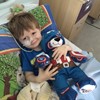What happens when I give blood?
The process of giving blood
Before giving blood
-
1
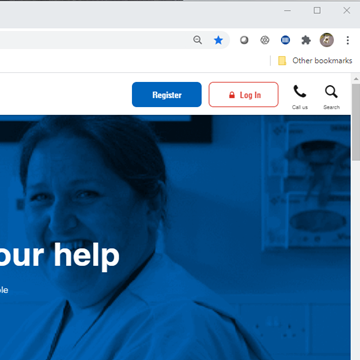
Sign up to save lives
- If you haven't given blood before (or haven't given for a while), you can sign up online or over the phone.
- To sign up online, just click the 'Register' button (or the little red head icon if you're using a phone or tablet) at the top right of this website, and fill in the form. As soon as you've registered you can use the online account to make your first appointment.
- You can also telephone us to register and make an appointment on 0345 90 90 999.
- We'll put your name, address and date of birth on the blood donor database.
-
2
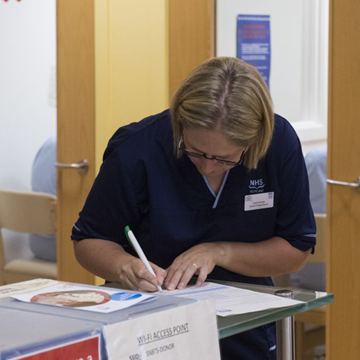
We'll write
- If you live in a city with a donor centre, we'll invite you to give blood soon after. You must leave twelve weeks between donations, so after that, we'll get in touch when you can give blood again.
- If you give blood in your community, we'll invite you to your next local blood donor session. After that we'll get in touch when we're in your area.
-
3
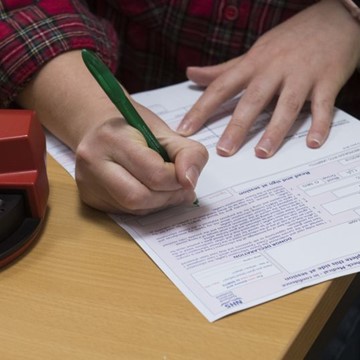
Get ready
- As part of our invite, we send a donor health check form, which goes through your medical, lifestyle and travel history. Fill it in and bring it with you - it'll save time when you arrive. However, if you lose it or it gets damaged, that's fine - just come along anyway.
- On the day, check you're feeling fit and rested. Give yourself plenty of time to avoid rushing.
- In the three hours before you give blood, eat something salty or savoury, and drink three glasses of water.
- If you have any questions about your health, travel or lifestyle (or need to cancel or rearrange your appointment), give the donor advice line a quick ring on 0345 90 90 999
-
4
More information
Before coming to your first session please take a look at our Donor Information Leaflet and sample Donor Health Check Form. You can also have a look at our post-donation card.
While giving blood
-
1
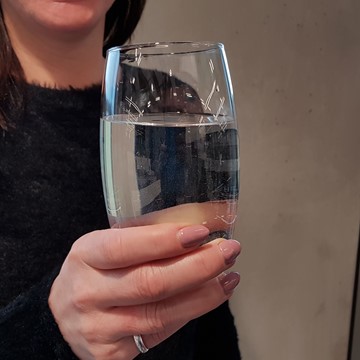
When you arrive
- Whether it’s your first time or your fortieth, you’ll get a warm welcome.
- We’ll take your name and address and take your donor health check form, or give you one to fill out.
- The health check form goes through your medical, lifestyle and travel history. It's completely confidential and designed to protect you and the person who receives your blood.
- We’ll give you 500ml of water to drink. This might seem a lot, but we know it will make you less likely to feel faint.
-
2
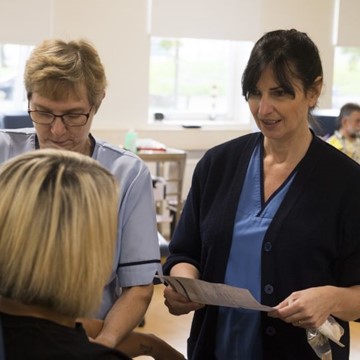
Talk to us
- A staff member will go over your health check form and make sure you're eligible to donate. You can also ask any questions you might have.
- There are more than 200 rules affecting whether a person is eligible to give blood, and different rules affect eligibility for different lengths of time. If we're not able to take your blood at this time, we'll explain why.
-
3
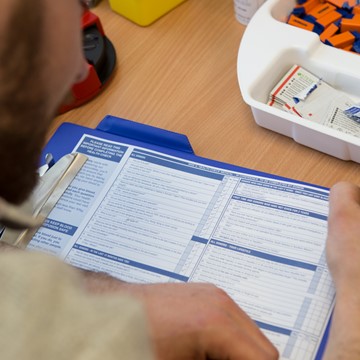
Agree to give blood
- Next, read the donor consent form.
- This is a legal requirement to show you understand what's involved in giving blood. If you agree, sign it.
- If you decide you don't want to give blood, you can leave at any time, no questions asked.
-
4
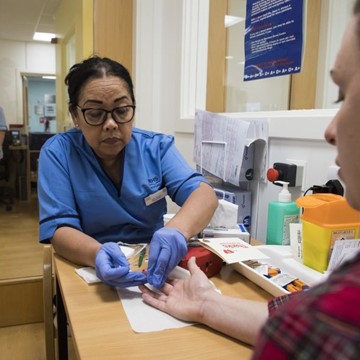
Finger prick test
- Finally, we test a small drop of blood from your finger to make sure you're not anaemic.
- If the test shows enough haemoglobin (a protein which contains iron), you can give blood.
- If your haemoglobin seems low, another small blood sample may be taken from your arm and tested.
- If this second test is okay, you may be able to give blood. If not, we'll advise you on what to do next.
-
5
Exercise for success
Muscle tensing exercises help maintain your blood pressure and can prevent you from feeling lightheaded. Follow these simple exercises before the needle goes in, before the needle comes out, before getting off the bed or at any time you feel unwell:
- Cross your legs
- Press your thighs together and tense your abdominal muscles
- At the same time stretch your ankles so that your toes point towards you
- Hold this position for five seconds then relax for five seconds
- Repeat five times on this side
- Now re-cross your legs the other way, and repeat.
-
6
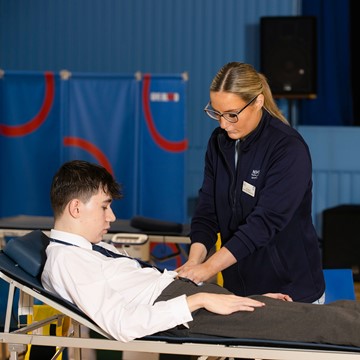
Give blood
- When you're ready, we'll put a pressure cuff round your upper arm, clean the crook of your elbow with antiseptic, then insert the needle. This leads to a blood bag, which sits on an agitator scale beside you.
- The scales constantly weigh and monitor your donation, and will stop automatically when you've given enough blood.
- It usually only takes 5-15 minutes to donate a full unit of blood. As part of this process we set aside a few small samples of blood for testing.
- While you're giving blood, you can read, chat, or just have a daydream. We'll keep an eye on you to make sure you're OK.
- When you're done, we'll take the needle out carefully, and put on a sterile dressing.
-
7
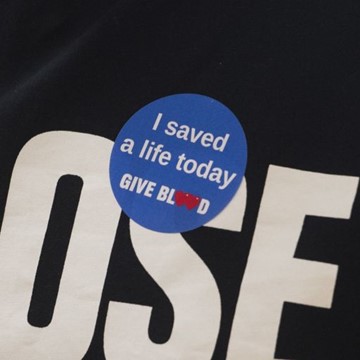
Take it easy
- Rest on the bed for at least three minutes after your donation is complete. Have a snack and a drink - everyone knows this is the best bit!
- It takes around an hour to give blood. However, you can bask in the knowledge that you're a lifesaver for as long as you want.
- If you feel unwell or suffer any discomfort or problems after giving blood, or if you have doubts about whether your blood should be used for patients, please let us know on 0345 90 90 999
-
8
More information
Before coming to your first session please take a look at our Donor Information Leaflet and sample Donor Health Check Form. You can also have a look at our post-donation card.
After giving blood
-
1
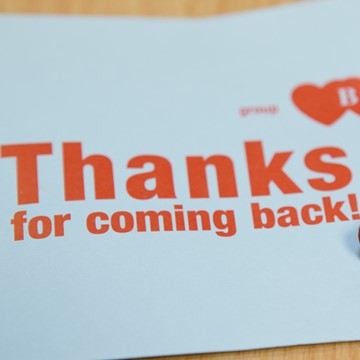
Immediately afterwards
- Most people feel fine after donating blood - in fact, you're likely to feel pretty good about yourself. However, if you do feel faint, sore or ill, let us know.
- Drink as much as you like, and have more than one snack – you deserve it. Sit down til you feel ready to go.
-
2

After you leave
- Look after yourself for the rest of the day.
- Drink three glasses of water over the next three hours, and don't forget to eat.
- Avoid strenuous exercise, hazardous activities, prolonged standing or hot baths, as these can make you feel faint.
- You can take the dressing off your arm after a couple of hours, but avoid heavy lifting for the rest of the day.
- Don’t take part in any hazardous activities, as you may have less energy and concentration than usual.
- Avoid drinking too much alcohol, as this will add to the effects of losing a unit of blood
- We recommend you don’t smoke for the first two hours after giving blood, because it can make you feel faint.
-
3
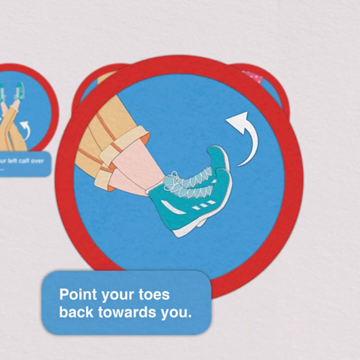
If you feel unwell
- Sit or lie down straight away.
- Restart muscle tensing exercises.
- Ask a friend or relative to keep an eye on you.
- If you’re driving, pull over and park immediately, then call for help. Don’t drive if you feel unwell.
- Wait for your symptoms to settle before getting up slowly.
- Let us know if you feel unwell after giving blood by ringing the donor advice line on 0345 90 90 999. If you need immediate help contact your GP, NHS24 on 111 or your local A&E. In an emergency, phone 999
- Just so you know, we record if anything goes wrong with blood donation. We do this to improve our procedures and to make sure our donors are as safe as possible. We always investigate severe, unintended and unexpected complications of donation. We follow the Duty of Candour regulations and share our findings with anyone who has been affected.
-
4
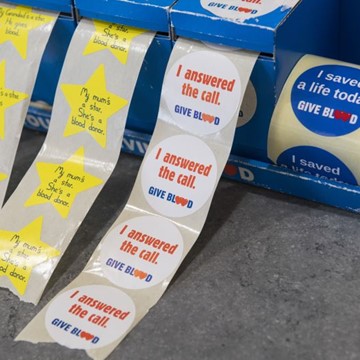
Over the next two weeks
- If you become ill over the next two weeks, it's extremely important that you let us know. You don’t need to tell us about simple coughs, colds or flu, but other illnesses may mean we can’t use your blood for patients. Call our donor helpline on 0345 90 90 999, or email nss.snbtsenquiry@nhs.scot
-
5
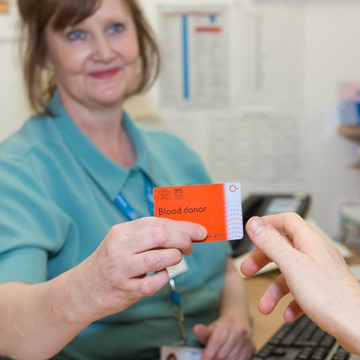
In four months time
- Keep an eye on your mail, and our blood stocks levels. You're able to give blood any time now, but we'll definitely be in touch when stocks of your blood type starts getting low.
- If you're a brand new blood donor, we'll have sent you you a donor card with your name, donor number and blood type on it. Bring it with you next time you come to give blood.
-
6
More information
Before coming to your first session please take a look at our Donor Information Leaflet and sample Donor Health Check Form. You can also have a look at our post-donation card.
-
7
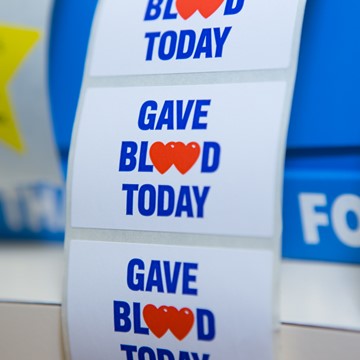
Any other questions?
- Give us a ring on 0345 90 90 999 - our team are here to help.
Different ways to give

